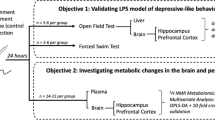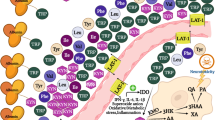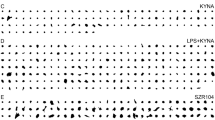Abstract
Inflammation activates indoleamine 2,3-dioxygenase (IDO) which metabolizes tryptophan into kynurenine. Circulating kynurenine is transported into the brain by the large amino transporter LAT1 at the level of the blood-brain barrier. We hypothesized that administration of leucine that has a high affinity for LAT1 should prevent the entry of kynurenine into the brain and attenuate the formation of neurotoxic kynurenine metabolites. To test whether leucine could prevent inflammation-induced depression-like behavior, mice were treated with lipopolysaccharide (LPS, 0.83 mg/kg IP) or saline and treated with l-leucine (50 mg/kg, IP) or vehicle administered before and 6 h after LPS. Depression-like behavior was measured by increased duration of immobility in the forced swim test and decreased sucrose preference. Leucine decreased brain kynurenine levels, blocked LPS-induced depression-like behavior and had antidepressant-like effects in control mice. Leucine had no effect of its own on sickness behavior and neuroinflammation. To confirm that leucine acts by interfering with the transport of kynurenine into the brain, mice were injected with l-leucine (300 mg/kg, IP) immediately before kynurenine (33 mg/kg IP) and brain kynurenine and depression-like behavior were measured 3 h later. Leucine did prevent the entry of exogenous kynurenine into the brain and abrogated depression-like behavior measured by increased duration of immobility in the forced swim test. Additional experiments using an in vitro model of the blood-brain barrier confirmed that kynurenine competes with leucine at the level of the amino acid transporter LAT1 for brain uptake. These experiments also revealed that efflux was the dominant direction of kynurenine transport and was largely independent of LAT1 and leucine, which explains why leucine could block brain uptake of kynurenine without affecting brain clearance. These findings demonstrate that leucine has antidepressant properties vis-à-vis inflammation-induced depression and one mechanism for this is by blocking the ability of kynurenine to enter the brain.
This is a preview of subscription content, access via your institution
Access options
Subscribe to this journal
Receive 12 print issues and online access
$259.00 per year
only $21.58 per issue
Buy this article
- Purchase on Springer Link
- Instant access to full article PDF
Prices may be subject to local taxes which are calculated during checkout




Similar content being viewed by others
References
Schwarcz R, Bruno JP, Muchowski PJ, Wu HQ. Kynurenines in the mammalian brain: when physiology meets pathology. Nat Rev Neurosci. 2012;13:465–77.
Walker AK, Budac DP, Bisulco S, Lee AW, Smith RA, Beenders B, et al. NMDA receptor blockade by ketamine abrogates lipopolysaccharide-induced depressive-like behavior in C57BL/6J mice. Neuropsychopharmacology. 2013;38:1609–16.
Bonaccorso S, Marino V, Puzella A, Pasquini M, Biondi M, Artini M, et al. Increased depressive ratings in patients with hepatitis C receiving interferon-alpha-based immunotherapy are related to interferon-alpha-induced changes in the serotonergic system. J Clin Psychopharmacol. 2002;22:86–90.
Capuron L, Neurauter G, Musselman DL, Lawson DH, Nemeroff CB, Fuchs D, et al. Interferon-alpha-induced changes in tryptophan metabolism. relationship to depression and paroxetine treatment. Biol Psychiatry. 2003;54:906–14.
Maes M, Bonaccorso S, Marino V, Puzella A, Pasquini M, Biondi M, et al. Treatment with interferon-alpha (IFN alpha) of hepatitis C patients induces lower serum dipeptidyl peptidase IV activity, which is related to IFN alpha-induced depressive and anxiety symptoms and immune activation. Mol Psychiatry. 2001;6:475–80.
Raison CL, Dantzer R, Kelley KW, Lawson MA, Woolwine BJ, Vogt G, et al. CSF concentrations of brain tryptophan and kynurenines during immune stimulation with IFN-alpha: relationship to CNS immune responses and depression. Mol Psychiatry. 2010;15:393–403.
O’Connor JC, Lawson MA, Andre C, Briley EM, Szegedi SS, Lestage J, et al. Induction of IDO by bacille Calmette-Guerin is responsible for development of murine depressive-like behavior. J Immunol. 2009;182:3202–12.
O’Connor JC, Lawson MA, Andre C, Moreau M, Lestage J, Castanon N, et al. Lipopolysaccharide-induced depressive-like behavior is mediated by indoleamine 2,3-dioxygenase activation in mice. Mol Psychiatry. 2009;14:511–22.
Parrott JM, Redus L, Santana-Coelho D, Morales J, Gao X, O’Connor JC. Neurotoxic kynurenine metabolism is increased in the dorsal hippocampus and drives distinct depressive behaviors during inflammation. Transl Psychiatry. 2016;6:e918.
Kita T, Morrison PF, Heyes MP, Markey SP. Effects of systemic and central nervous system localized inflammation on the contributions of metabolic precursors to the L-kynurenine and quinolinic acid pools in brain. J Neurochem. 2002;82:258–68.
Boado RJ, Li JY, Nagaya M, Zhang C, Pardridge WM. Selective expression of the large neutral amino acid transporter at the blood-brain barrier. Proc Natl Acad Sci USA. 1999;96:12079–84.
Omidi Y, Barar J, Ahmadian S, Heidari HR, Gumbleton M. Characterization and astrocytic modulation of system L transporters in brain microvasculature endothelial cells. Cell Biochem Funct. 2008;26:381–91.
O’Connor JC, Andre C, Wang Y, Lawson MA, Szegedi SS, Lestage J, et al. Interferon-gamma and tumor necrosis factor-alpha mediate the upregulation of indoleamine 2,3-dioxygenase and the induction of depressive-like behavior in mice in response to bacillus Calmette-Guerin. J Neurosci. 2009;29:4200–9.
Ni Y, Teng T, Li R, Simonyi A, Sun GY, Lee JC. TNFα alters occludin and cerebral endothelial permeability: Role of p38MAPK. PLoS ONE. 2017;12:e0170346.
Sekine A, Okamoto M, Kanatani Y, Sano M, Shibata K, Fukuwatari T. Amino acids inhibit kynurenic acid formation via suppression of kynurenine uptake or kynurenic acid synthesis in rat brain in vitro. Springerplus. 2015;4:48.
Giri SS, Sen SS, Jun JW, Sukumaran V, Park SC. Protective effects of leucine against lipopolysaccharide-induced inflammatory response in Labeo rohita fingerlings. Fish Shellfish Immunol. 2016;52:239–47.
Wang XD, Notarangelo FM, Wang JZ, Schwarcz R. Kynurenic acid and 3-hydroxykynurenine production from D-kynurenine in mice. Brain Res. 2012;1455:1–9.
Banks WA. The blood-brain barrier in neuroimmunology: tales of separation and assimilation. Brain Behav Immun. 2015;44:1–8.
Kita T, Morrison PF, Heyes MP, Markey S. Effects of systemic and central nervous system localized inflammation on the contributions of metabolic precursors to the L‐kynurenine and quinolinic acid pools in brain. J Neurochem. 2002;82:258–68.
Lynch CJ, Adams SH. Branched-chain amino acids in metabolic signalling and insulin resistance. Nat Rev Endocrinol. 2014;10:723–36.
Acknowledgements
This work was supported by the University of Texas MD Anderson Cancer Center [Support Grant CA016672], National Institutes of Health (R21MH104694), and the National Institutes of Health National Institute of Neurological Disorders and Stroke [R01-NS073939]. R.D. has received honorarium from the Danone Nutricia Research for work not related to this study. A.K.W. is supported by a National Breast Cancer Foundation fellowship (PF-15-014). We thank Dr. Subhashree Kumaravel and Ms. Darlene Estrada for their help with the determination of the effects of leucine on kynurenine transport in the brain. We thank Jasmin Walker for her artistic input.
Author information
Authors and Affiliations
Corresponding author
Ethics declarations
Conflict of interest
R.D. has received honoraria from the Danone Nutricia Research, France, that are not related to the work presented in this article. The remaining authors declare no conflict of interest.
Electronic supplementary material
Rights and permissions
About this article
Cite this article
Walker, A.K., Wing, E.E., Banks, W.A. et al. Leucine competes with kynurenine for blood-to-brain transport and prevents lipopolysaccharide-induced depression-like behavior in mice. Mol Psychiatry 24, 1523–1532 (2019). https://doi.org/10.1038/s41380-018-0076-7
Received:
Revised:
Accepted:
Published:
Issue Date:
DOI: https://doi.org/10.1038/s41380-018-0076-7
This article is cited by
-
Gastrointestinal and brain barriers: unlocking gates of communication across the microbiota–gut–brain axis
Nature Reviews Gastroenterology & Hepatology (2024)
-
Kaixin Jieyu Granule attenuates neuroinflammation-induced depressive-like behavior through TLR4/PI3K/AKT/FOXO1 pathway: a study of network pharmacology and experimental validation
BMC Complementary Medicine and Therapies (2023)
-
CRHR1 antagonist alleviates LPS-induced depression-like behaviour in mice
BMC Psychiatry (2023)
-
Microbiome and tryptophan metabolomics analysis in adolescent depression: roles of the gut microbiota in the regulation of tryptophan-derived neurotransmitters and behaviors in human and mice
Microbiome (2023)
-
Genetic risk of depression is different in subgroups of dietary ratio of tryptophan to large neutral amino acids
Scientific Reports (2023)



